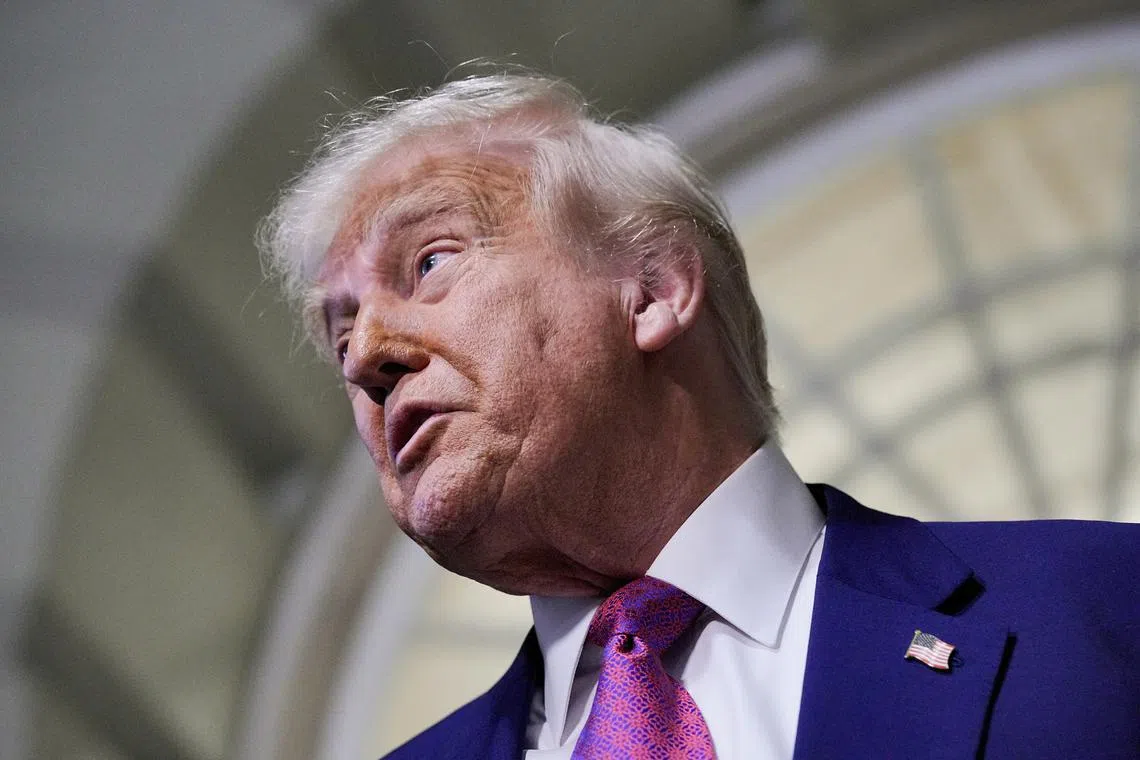Trump tax Bill narrowly passes House, overcoming GOP infighting
Sign up now: Get ST's newsletters delivered to your inbox

US President Donald Trump visited the Capitol to rally Republicans, worked lawmakers by phone late into the night and summoned holdouts to the Oval Office.
PHOTO: REUTERS
Follow topic:
US President Donald Trump’s signature tax Bill narrowly passed the House on the morning of May 22, overcoming fierce Republican infighting
The Bill now heads to the Senate, where groups of Republicans are pressing for extensive changes and lawmakers plan to vote on approval by August.
It includes a US$4 trillion (S$5.17 trillion) increase in the US debt ceiling, which the Treasury Department forecasts could otherwise force a default as soon as August or September, adding urgency to the timeline.
The House vote, which stood at 215 for and 214 against, followed a furious White House offensive as Mr Trump visited the Capitol to rally Republicans, worked lawmakers by phone late into the night and summoned holdouts to the Oval Office.
His budget office released a statement branding any GOP lawmaker who failed to support the package guilty of the “ultimate betrayal”.
House Speaker Mike Johnson and his lieutenants went through rounds of negotiations in his suite steps from the House floor to balance the demands of lawmakers from high-tax states pressing for an increase in the state and local tax deduction, hardline conservatives insisting on deeper spending cuts and vulnerable swing-district Republicans wary of slashing Medicaid.
The measure would avoid a blow to US growth just as the economy struggles with the impact of the steepest tariff increases in almost a century, though it is expected to add hundreds of billions a year to the deficit.
It would extend Mr Trump’s first-term tax cuts due to expire on Dec 31, along with new tax relief including raising the limit on the deduction for state and local taxes to US$40,000, and temporarily exempting tips and overtime pay from taxes.
Cuts to safety-net programmes such as food stamps and Medicaid health coverage for the poor and disabled could worsen economic inequality even as wealthy Americans gain the largest share of tax cuts.
Deficits driven by the tax cuts also risk exacerbating bond investors’ concerns about the ballooning US debt, highlighted by Moody’s decision to downgrade the US government’s credit rating
Democrats vowed to make House Republicans pay a price in 2026’s mid-term elections, casting the measure as a Robin Hood-in-reverse effort to take from the poor and give to the rich.
“The GOP tax scam will hurt working families the most while delivering massive tax breaks for billionaires like Elon Musk,” said House Minority Leader Hakeem Jeffries of New York.
Republicans counter that their voters will be energised by the enactment of Mr Trump’s top legislative priority for the year and reward them politically.
Spending cuts
Ultraconservative Freedom Caucus members were able to insert new language in the Bill that would dramatically speed up the end of clean energy tax credits passed under the Biden administration, which would generally have to be put in to service before 2029 and would have to be well under way within 60 days of the Bill’s enactment.
The hardliners also were able to move up the start date for new Medicaid work requirements to December 2026 from a 2029 start in the initial version of the package.
The acceleration of new Medicaid work requirements could become an issue in the mid-term elections – which fall just one month earlier – with Democrats eager to criticise Republicans for restricting health benefits for low-income households.
Mr Johnson was also able to strike an elusive deal with lawmakers from high-tax states on the state and local tax deduction.
The deal would raise the US$10,000 cap to US$40,000 for individuals and joint filers starting this year, with a phase-out for those making more than US$500,000 per year. The cap would increase by 1 per cent a year for 10 years.
Other sweeteners were added for states like Texas, which would be the main beneficiary of US$12 billion in reimbursements for state border security expenses incurred in recent years.
GOP leaders also eliminated a provision that would have cut federal pensions by basing benefits on the highest five years of salary rather than the highest three, in a move cheered by Republican Representative Mike Turner of Ohio, who called a pension cut “unfair”.
The package also imposes tax increases on targets of Mr Trump’s ire such as Harvard University and immigrants.
Private universities with large endowments per student would pay a 21 per cent tax on net investment income, up from the current rate of 1.4 per cent. Immigrants would face a new levy on transfers of money to foreign countries.
The Bill would boost military spending by US$150 billion and add US$175 billion for immigration enforcement, both top Trump priorities.
It also includes numerous other provisions affecting healthcare, energy production and manufacturing, reorienting the government away from climate change concerns in favour of fossil fuels.
That includes the elimination of most electric vehicle tax credits – including for market leader Tesla – by the end of 2025, replaced by a tax break for auto loan interest for US-built vehicles, a move championed by Mr Trump and Ohio Senator Bernie Moreno.
Late changes to the Bill even included changing the name of new savings accounts for babies born in the next few years, to be seeded with US$1,000 from the government.
The accounts are now known as “Trump” accounts instead of “Maga” accounts.
Republican senators have said they will press for substantial changes before the approving the package.
A number of Senate Republicans want to make permanent tax cuts that are now temporary under the package, especially breaks benefiting businesses.
Meanwhile, some GOP senators have warned against any cuts to Medicaid, while others have pushed for far deeper overall spending cuts. BLOOMBERG

